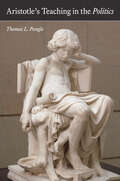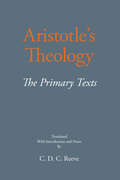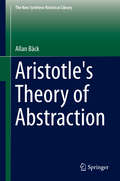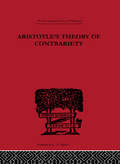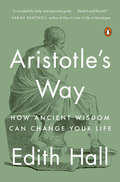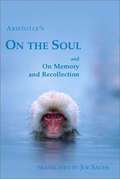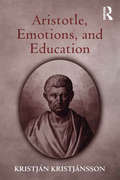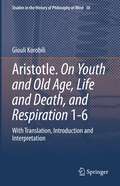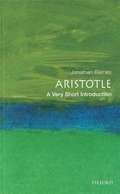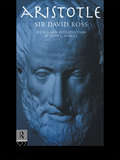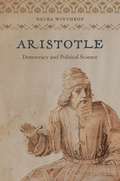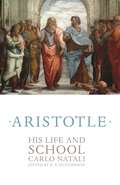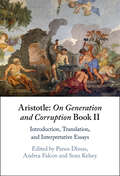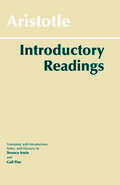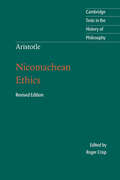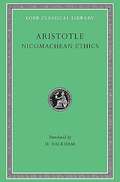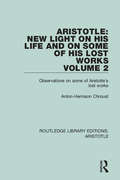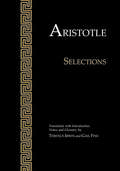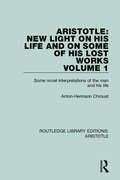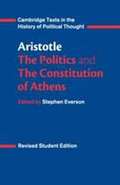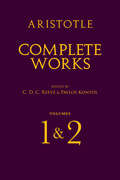- Table View
- List View
Aristotle's Teaching in the Politics
by Thomas L. PangleWith Aristotle’s Teaching in the “Politics,” Thomas L. Pangle offers a masterly new interpretation of this classic philosophical work. It is widely believed that the Politics originated as a written record of a series of lectures given by Aristotle, and scholars have relied on that fact to explain seeming inconsistencies and instances of discontinuity throughout the text. Breaking from this tradition, Pangle makes the work’s origin his starting point, reconceiving the Politics as the pedagogical tool of a master teacher.With the Politics, Pangle argues, Aristotle seeks to lead his students down a deliberately difficult path of critical thinking about civic republican life. He adopts a Socratic approach, encouraging his students—and readers—to become active participants in a dialogue. Seen from this perspective, features of the work that have perplexed previous commentators become perfectly comprehensible as artful devices of a didactic approach. Ultimately, Pangle’s close and careful analysis shows that to understand the Politics, one must first appreciate how Aristotle’s rhetorical strategy is inextricably entwined with the subject of his work.
Aristotle's Theology: The Primary Texts (The New Hackett Aristotle)
by Aristotle"Even those already familiar with Aristotle may be surprised to learn that discussions of theological topics can be found in so many of his works. Reeve's idea of packaging these texts sequentially along with commentary and notes is brilliant. This book will be essential reading for anyone interested in Aristotle's theology."—S. Marc Cohen,Professor of Philosophy, Emeritus, University of Washington
Aristotle's Theory of Abstraction (The New Synthese Historical Library #73)
by Allan BäckThis book investigates Aristotle's views on abstraction and explores how he uses it. In this work, the author follows Aristotle in focusing on the scientific detail first and then approaches the metaphysical claims, and so creates a reconstructed theory that explains many puzzles of Aristotle's thought. Understanding the details of his theory of relations and abstraction further illuminates his theory of universals. Some of the features of Aristotle's theory of abstraction developed in this book include: abstraction is a relation; perception and knowledge are types of abstraction; the objects generated by abstractions are relata which can serve as subjects in their own right, whereupon they can appear as items in other categories. The author goes on to look at how Aristotle distinguishes the concrete from the abstract paronym, how induction is a type of abstraction which typically moves from the perceived individuals to universals and how Aristotle's metaphysical vocabulary is "relational. ' Beyond those features, this work also looks at how of universals, accidents, forms, causes and potentialities have being only as abstract aspects of individual substances. An individual substance is identical to its essence; the essence has universal features but is the singularity making the individual substance what it is. These theories are expounded within this book. One main attraction in working out the details of Aristotle's views on abstraction lies in understanding his metaphysics of universals as abstract objects. This work reclaims past ground as the main philosophical tradition of abstraction has been ignored in recent times. It gives a modern version of the medieval doctrine of the threefold distinction of essence, made famous by the Islamic philosopher, Avicenna.
Aristotle's Theory of Contrariety (International Library of Philosophy)
by J.P. AntonFirst published in 2000. Routledge is an imprint of Taylor & Francis, an informa company.
Aristotle's Way: How Ancient Wisdom Can Change Your Life
by Edith HallFrom renowned classicist Edith Hall, ARISTOTLE'S WAY is an examination of one of history's greatest philosophers, showing us how to lead happy, fulfilled, and meaningful livesAristotle was the first philosopher to inquire into subjective happiness, and he understood its essence better and more clearly than anyone since. According to Aristotle, happiness is not about well-being, but instead a lasting state of contentment, which should be the ultimate goal of human life. We become happy through finding a purpose, realizing our potential, and modifying our behavior to become the best version of ourselves. With these objectives in mind, Aristotle developed a humane program for becoming a happy person, which has stood the test of time, comprising much of what today we associate with the good life: meaning, creativity, and positivity. Most importantly, Aristotle understood happiness as available to the vast majority us, but only, crucially, if we decide to apply ourselves to its creation--and he led by example. As Hall writes, "If you believe that the goal of human life is to maximize happiness, then you are a budding Aristotelian."In expert yet vibrant modern language, Hall lays out the crux of Aristotle's thinking, mixing affecting autobiographical anecdotes with a deep wealth of classical learning. For Hall, whose own life has been greatly improved by her understanding of Aristotle, this is an intensely personal subject. She distills his ancient wisdom into ten practical and universal lessons to help us confront life's difficult and crucial moments, summarizing a lifetime of the most rarefied and brilliant scholarship.
Aristotle's: On the Soul and On Memory and Recollection
by Aristotle Joe SachsIn this timeless and profound inquiry, Aristotle presents a view of the psyche that avoids the simplifications both of the materialists and those who believe in the soul as something quite distinct from body. On the Soul also includes Aristotle's idiosyncratic and influential account of light and colors. On Memory and Recollection continues the investigation of some of the topics introduced in On the Soul. Sachs's fresh and jargon-free approach to the translation of Aristotle, his lively and insightful introduction, and his notes and glossaries, all bring out the continuing relevance of Aristotle's thought to biological and philosophical questions.
Aristotle, Emotions, and Education
by Kristján KristjánssonWhat can Aristotle teach us that is relevant to contemporary moral and educational concerns? What can we learn from him about the nature of moral development, the justifiability and educability of emotions, the possibility of friendship between parents and their children, or the fundamental aims of teaching? The message of this book is that Aristotle has much to teach us about those issues and many others. In a formidable display of boundary-breaking scholarship, drawing upon the domains of philosophy, education and psychology, Kristján Kristjánsson analyses and dispels myriad misconceptions about Aristotle’s views on morality, emotions and education that abound in the current literature - including the claims of the emotional intelligence theorists that they have revitalised Aristotle’s message for the present day. The book proceeds by enlightening and astute forays into areas covered by Aristotle’s canonical works, while simultaneously gauging their pertinence for recent trends in moral education. This is an arresting book on how to balance the demands of head and heart: a book that deepens the contemporary discourse on emotion cultivation and virtuous living and one that will excite any student of moral education, whether academic or practitioner.
Aristotle, Plato and Pythagoreanism in the First Century BC
by Malcolm SchofieldThis book presents an up-to-date overview of the main new directions taken by ancient philosophy in the first century BC, a period in which the dominance exercised in the Hellenistic age by Stoicism, Epicureanism and Academic Scepticism gave way to a more diverse and experimental philosophical scene. Its development has been much less well understood, but here a strong international team of leading scholars of the subject reconstruct key features of the changed environment. They examine afresh the evidence for some of the central Greek thinkers of the period, as well as illuminating Cicero's engagement with Plato both as translator and in his own philosophising. The intensity of renewed study of Aristotle's Categories and Plato's Timaeus is an especially striking outcome of their discussions. The volume will be indispensable for scholars and students interested in the history of Platonism and Aristotelianism.
Aristotle. On Youth and Old Age, Life and Death, and Respiration 1-6: With Translation, Introduction and Interpretation (Studies in the History of Philosophy of Mind #30)
by Giouli KorobiliThis book is devoted to the last part of Aristotle’s collection of short treatises known today as the Parva Naturalia, i.e. the treatise On Youth and Old Age, on Life and Death, on Respiration. In the three main sections of the book, the author offers a translation, a commentary and a thorough analysis of this work. The author argues in favour of the unity of the work and contextualises its ideas within Aristotle’s corpus and the medical tradition of his time. After an Introduction to the nature of the work and its significance for the history of natural philosophy and science, a new English translation follows, along with a detailed commentary of Chapters 1-6, which combines philosophical discussion with philological observations. The book includes four interpretive essays, which tackle problems related to the whole treatise on a more philosophical basis, including questions about the structure and unity of the work, the organisation of the material, Aristotle’s methodological principles, his aims and target audience as well as the relevance of his selected themes to the thematic agenda of some Hippocratic writings. This book is of interest to students and researchers in Aristotle’s psychophysiology, and his views about the embodied mind, as well as to anyone concerned with the history of natural philosophy and science more generally.
Aristotle: A Very Short Introduction
by Jonathan BarnesAristotle died in the autumn of 322 BC He was sixty-two and at the height of his powers: a scholar whose scientific explorations were as wide-ranging as his philosophical speculations were profound; a teacher who enchanted and inspired the brightest youth of Greece; a public figure who lived a turbulent life in a turbulent world. He bestrode antiquity like an intellectual colossus. No man before him had contributed so much to learning. No man after him might aspire to rival his achievements.
Aristotle: De Anima
by David RossSir David Ross was one of the most distinguished and influential Aristotelians of this century; his study has long been established as an authoritative survey of the life, work and philosophy of Aristotle.This clear and lucid account contains useful summaries of theories and arguments, with brief, suggestive critical comments. Aristotle's work encompassed all the branches of science and learning which were central to the intellectual life of the ancient world: logic, the philosophy of nature, biology, psychology, metaphysics, ethics, politics, rhetoric and poetics. Aristotle's borrowings from his predecessors, and his own fundamental influence on later philosophy, are also examined. Important Greek terms in Aristotle's work are explained and discussed.Aristotle is now re-issued with a new introduction by John L. Ackrill, which reviews developments in Aristotelian studies since Sir David Ross originally wrote his classic study. The bibliography has been supplemented by references to recent works. Both students of philosophy and general rea ders will find the volume an indispensable guide to Aristotle's thought.
Aristotle: Democracy and Political Science
by Delba WinthropToday, democracy is seen as the best or even the only legitimate form of government—hardly in need of defense. Delba Winthrop punctures this complacency and takes up the challenge of justifying democracy through Aristotle’s political science. In Aristotle’s time and in ours, democrats want inclusiveness; they want above all to include everyone a part of a whole. But what makes a whole? This is a question for both politics and philosophy, and Winthrop shows that Aristotle pursues the answer in the Politics. She uncovers in his political science the insights philosophy brings to politics and, especially, the insights politics brings to philosophy. Through her appreciation of this dual purpose and skilled execution of her argument, Winthrop’s discoveries are profound. Central to politics, she maintains, is the quality of assertiveness—the kind of speech that demands to be heard. Aristotle, she shows for the first time, carries assertive speech into philosophy, when human reason claims its due as a contribution to the universe. Political science gets the high role of teacher to ordinary folk in democracy and to the few who want to understand what sustains it. This posthumous publication is more than an honor to Delba Winthrop’s memory. It is a gift to partisans of democracy, advocates of justice, and students of Aristotle.
Aristotle: His Life and School
by Carlo NataliThe definitive account of Aristotle's life and schoolThis definitive biography shows that Aristotle's philosophy is best understood on the basis of a firm knowledge of his life and of the school he founded. First published in Italian, and now translated, updated, and expanded for English readers, this concise chronological narrative is the most authoritative account of Aristotle's life and his Lyceum available in any language. Gathering, distilling, and analyzing all the evidence and previous scholarship, Carlo Natali, one of the world's leading Aristotle scholars, provides a masterful synthesis that is accessible to students yet filled with evidence and original interpretations that specialists will find informative and provocative.Cutting through the controversy and confusion that have surrounded Aristotle's biography, Natali tells the story of Aristotle's eventful life and sheds new light on his role in the foundation of the Lyceum. Natali offers the most detailed and persuasive argument yet for the view that the school, an important institution of higher learning and scientific research, was designed to foster a new intellectual way of life among Aristotle's followers, helping them fulfill an aristocratic ideal of the best way to use the leisure they enjoyed. Drawing a wealth of connections between Aristotle's life and thinking, Natali demonstrates how the two are mutually illuminating.For this edition, ancient texts have been freshly translated on the basis of the most recent critical editions; indexes have been added, including a comprehensive index of sources and an index to previous scholarship; and scholarship that has appeared since the book's original publication has been incorporated.
Aristotle: Introduction, Translation, and Interpretative Essays
by Andrea Falcon Sean Kelsey Panos DimasGeneration and Corruption II is concerned with Aristotle's theory of the elements, their reciprocal transformations and the cause of their perpetual generation and corruption. These matters are essential to Aristotle's picture of the world, making themselves felt throughout his natural science, including those portions of it that concern living things. What is more, the very inquiry Aristotle pursues in this text, with its focus on definition, generality, and causation, throws important light on his philosophy of science more generally. This volume contains eleven new essays, one for each of the chapters of this Aristotelian text, plus a general introduction and an English translation of the Greek text. It gives substantial attention to an important and neglected text, and highlights its relevance to other topics of current and enduring interest.
Aristotle: Introductory Readings
by Aristotle Terence Irwin Gail FineDrawn from the translations and editorial aids of Irwin and Fine's Aristotle, Selections (Hackett Publishing Co., 1995), this anthology will be most useful to instructors who must try to do justice to Aristotle in a semester-long ancient-philosophy survey, but it will also be appropriate for a variety of introductory-level courses. Introductory Readings provides accurate, readable, and integrated translations that allow the reader to follow Aristotle's use of crucial technical terms and to grasp the details of his argument. Included are adaptations of the glossary and notes that helped make its parent volume a singularly useful aid to the study of Aristotle.
Aristotle: Nicomachean Ethics
by Roger CrispAristotle's Nicomachean Ethics, based on lectures that he gave in Athens in the fourth century BCE, is one of the most significant works in moral philosophy, and has profoundly influenced the whole course of subsequent philosophical endeavour. It is soundly located within a philosophical tradition, but its argument differs markedly from those of Plato and Socrates in its emphasis on the exercise - as opposed to the mere possession - of virtue as the key to human happiness, offering seminal discussions of ethical issues that are practical in their intent. Topics covered include the role of luck in human wellbeing, moral education, responsibility, courage, justice, moral weakness, friendship and pleasure. This accessible new translation by Roger Crisp follows the Greek text closely and also provides a non-Greek-reader with the flavour of the original. The volume also includes a historical and philosophical introduction and notes on further reading.
Aristotle: Nicomachean Ethics (Cambridge Texts In The History Of Philosophy Ser.)
by Roger CrispAristotle's Nicomachean Ethics, based on lectures that he gave in Athens in the fourth century BCE, is one of the most significant works in moral philosophy, and has profoundly influenced the whole course of subsequent philosophical endeavour. It is soundly located within a philosophical tradition, but its argument differs markedly from those of Plato and Socrates in its emphasis on the exercise - as opposed to the mere possession - of virtue as the key to human happiness, offering seminal discussions of ethical issues that are practical in their intent. Topics covered include the role of luck in human wellbeing, moral education, responsibility, courage, justice, moral weakness, friendship and pleasure. This accessible new translation by Roger Crisp follows the Greek text closely and also provides a non-Greek-reader with the flavour of the original. The volume also includes a historical and philosophical introduction and notes on further reading.
Aristotle: Nicomachean Ethics (Second Edition) (Loeb Classical Library #XIX)
by H. Rackham AristotleNearly all the works Aristotle (384-322 BCE) prepared for publication are lost; the priceless ones extant are lecture-materials, notes, and memoranda (some are spurious). They can be categorized as practical; logical; physical; metaphysical; on art; other; fragments.
Aristotle: Observations on Some of Aristotle's Lost Works (Routledge Library Editions: Aristotle #2)
by Anton-Hermann ChroustOriginally published in 1973. Aristotle’s early works probably belong to the formative era of his philosophic thought and as such contribute vitally to the understanding and evaluation of the development of his philosophy. This book shows that the philosophy propagated in these lost works indicates an undeniable Platonism, and thus seems to conflict with the basic doctrines in the traditional treatises collected in the Corpus Aristotelicum. Was the author of the lost early works and the later preserved treatises one and the same person, or were some of these treatises written by members of the Early Peripatus? This, the second of two volumes, discusses in detail certain decisive aspects of Aristotle’s early works. Fascinating hypotheses and conjectures put forward here provoke discussion and further investigation in the ‘Aristotelian Problem’.
Aristotle: Selections
by Aristotle Terence Irwin Gail FineSelections seeks to provide an accurate and readable translation that will allow the reader to follow Aristotle's use of crucial technical terms and to grasp the details of his argument. Unlike anthologies that combine translations by many hands, this volume includes a fully integrated set of translations by a two-person team. The glossary--the most detailed in any edition--explains Aristotle's vocabulary and indicates the correspondences between Greek and English words. Brief notes supply alternative translations and elucidate difficult passages.
Aristotle: Some Novel Interpretations of the Man and His Life (Routledge Library Editions: Aristotle #1)
by Anton-Hermann ChroustOriginally published in 1973. The predominantly historical approach in this book heralds a belief that a better understanding of Aristotle the man, and the salient events of his life, leads to a greater insight into his work as a philosopher. This, the first of two volumes, presents interpretations of Aristotle’s life, widely interesting to any Aristotle scholars.
Aristotle: The Desire to Understand
by Jonathan LearThis is a philosophical introduction to Aristotle, and Professor Lear starts where Aristotle himself starts. The first sentence of the Metaphysics states that all human beings by their nature desire to know. But what is it for us to be animated by this desire in this world? What is it for a creature to have a nature; what is our human nature; what must the world be like to be intelligible; and what must we be like to understand it systematically? Through a consideration of these questions Professor Lear introduces us to the essence of Aristotle's philosophy and guides us through the central Aristotelian texts - selected from the Physics, Metaphysics, Ethics, Politics and from the biological and logical works. The book is written in a direct, lucid style which engages the reader with the themes in an active, participatory manner.
Aristotle: The Politics and the Constitution of Athens
by AristotleThis new collection of Aristotle's political writings aims to provide the student with all the necessary materials for a full understanding of his work as a political scientist. Translated by Stephen Everson,
Aristotle: Two-Volume Set
by AristotleAristotle: Complete Works is a monumental achievement, the first new English-language translations of the Aristotelian corpus since 1954. Edited by C. D. C. Reeve and Pavlos Kontos, this beautifully produced two-volume cloth-bound set with smyth-sewn bindings aims for consistent translation of key terms across the works and includes a general Introduction by Christof Rapp, Catalogs of Aristotle’s Writings, an Annotated Index of People and Places, and an extensive Annotated Glossary of Terms.
Aristotle’s Ethics and Medieval Philosophy
by Anthony J. CelanoAristotle's Nicomachean Ethics had a profound influence on generations of later philosophers, not only in the ancient era but also in the medieval period and beyond. In this book, Anthony Celano explores how medieval authors recast Aristotle's Ethics according to their own moral ideals. He argues that the moral standard for the Ethics is a human one, which is based upon the ethical tradition and the best practices of a given society. In the Middle Ages, this human standard was replaced by one that is universally applicable, since its foundation is eternal immutable divine law. Celano resolves the conflicting accounts of happiness in Aristotle's Nicomachean Ethics, demonstrates the importance of the virtue of phronesis (practical wisdom), and shows how the medieval view of moral reasoning alters Aristotle's concept of moral wisdom.
